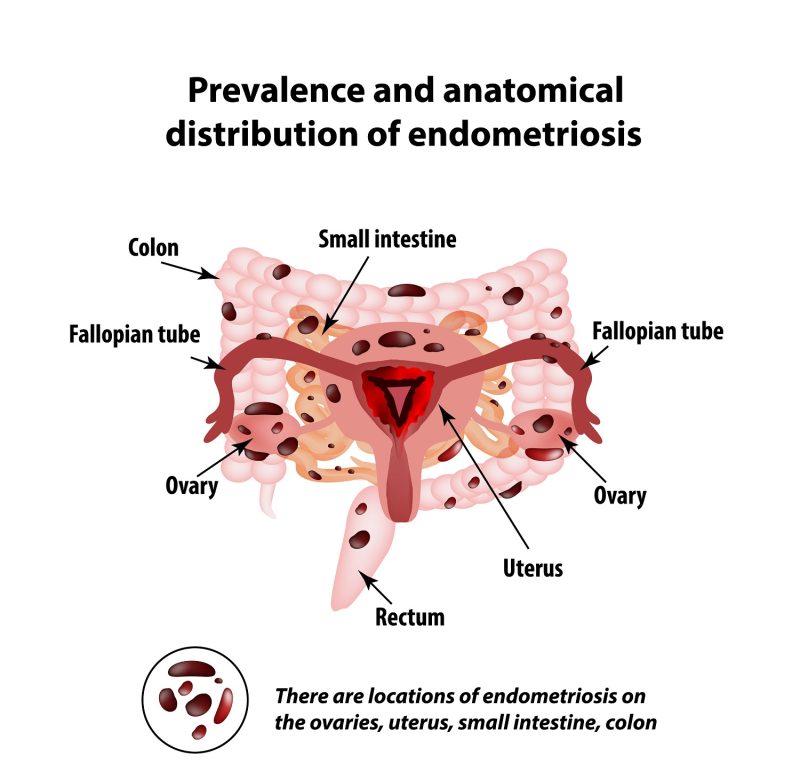Endometriosis
What Is Endometriosis?
Endometriosis, also called Endo, is an inflammatory disease when endometrial tissue grows outside the endometrium, which is the layer of tissue that lines the uterus. It grows in parts of the body where it doesn’t belong and can spread to the bowel, intestines, pelvis, chest, and there are also cases where endometriosis has spread to the joints, lungs, around the heart and to the brain.
This endometrial tissue responds to messages from the ovaries, so when the endometrial tissue gets full every month (as it does with your period) it bleeds. With time this process leads to inflammation and scarring, which then can cause adhesions (when organs stick together). This endometrial-like tissue that grows outside of the uterus is also known as endometrial implant.
Endometriosis is a chronic condition that is progressive and can be very painful, can affect fertility, and can cause a lot of grief in a women’s everyday life as it can prevent women from participating fully in education, work and other activities.
Endometriosis can cause
- Period pain
- Heavy bleeding during menstruation
- Ovulation pain
- Chronic fatigue
- Pain during sexual intercourse
- Bladder issues
- IBS like symptoms (Irritable Bowel Syndrome)

What are some of the symptoms and signs of endometriosis?
The symptoms of Endometriosis can vary depending on the person. Some women can experience mild symptoms while others can have moderate to severe symptoms. A woman that has a mild form of Endometriosis can have agonizing pain, while someone who have a severe form can experience a lot less discomfort. So, the severity of the symptoms and pain does not specify the degree or stage of Endo.
- Chronic pelvic pain
- Chronic pain in lower back
- Infertility
- Chronic fatigue
- Pain during or after sexual intercourse
- Intestinal pain
- Ovulation pain
- Period pain, can be severe
- Cramps 1-2 weeks around menstruation
- Dark and clotted menstrual blood, this is a key symptom
- Digestive issues
- IBS like symptoms (Irritable Bowel Syndrome)
- Emotional Disturbances
- Bloated and pressure around abdomen
- Pain down the legs
It’s important to mention that there are women who have Endometriosis but do not experience any of the above symptoms.
How is Endometriosis diagnosed?
Scans does not pick up superficial endometriosis and there is no blood test that can be done to confirm or diagnose. To get a definitive diagnosis, the gold standard investigation is a visual inspection of the pelvis through a laparoscopy. An endometriosis laparoscopy surgery is when an advanced trained surgeon goes in with a camera through the belly button to look for endometriosis.
How Is Endometriosis Treated and Managed?
Endometriosis has no cure, however the symptoms can be treated and managed with medicines, surgery and other complementary treatments like herbal medicines, physiotherapy, acupuncture and other natural supplements.
Important to note that if Endometriosis is left untreated, it will get worse and can cause debilitating challenges in everyday life.
The usual and most common Endometriosis treatment is an endometriosis surgery – a laparoscopic excision – where the surgeon, (who should always be an advanced trained laparoscopic surgeon who’s specifically trained and specialised in the excision of endometriosis) removes the endometriosis.
After surgery, it’s a matter of trying to stop the endo from growing back too quick and stay on top of managing remaining or reoccurring symptoms.
Some of the treatment options and how to manage endo:
- Pain medications
- NSAIDs which can be prescribed for their anti-inflammatory effects
- Hormone therapy like an IUD (Mirena). Women with Endometriosis should only have progesterone only options as Endometriosis are estrogen driven, therefore any hormone therapy with estrogen should be avoided.
- Acupuncture
- Chinese Medicine
- Certain supplements like a high-quality Omega 3, CBD oil, Curcumin etc
- Anti-inflammatory diet
- Bioidentical Progesterone cream
- Meditation and stress management
- Exercise
Endometriosis is a very complex condition and even if it’s treated, pain can persist and endometriosis may still come back after surgery. So, it’s important to seek help from a women’s health expert/Endometriosis specialist to get the right help right from the start. You’ll save both a lot of your time and money by doing so.
When To Seek Medical Help?
If you are experiencing any of the symptoms above and they are impacting your health (mentally, emotionally and physically), preventing you from functioning normally in your daily life and interfering in your relationship and sexual function – you should reach out to a women’s health specialist that specialises in this specific area.
